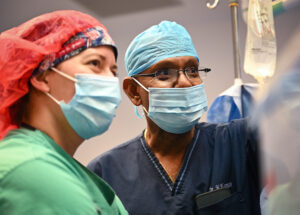
Story by Staff Sgt. Madeline Herzog
12th Air Force (Air Forces Southern) Public Affairs
CASTRIES, St. Lucia – Have you ever felt the pain and devastation of losing a parent? The immense weight of wondering what they might have been thinking or feeling as they closed their eyes for the last time?
Augustus Wayne Amos’ father passed away during a liver surgery in another country four days before Augustus received his own vascular surgery, one performed by members of the U.S. Air Force Lesser Antilles Medical Assistance Team Feb. 26, 2024, in St. Lucia. The LAMAT team has been in St. Lucia since Feb. 26, working to complement host nation medical teams in providing needed care for patients.
Amos went into the hospital that day feeling the loss and the heartache that comes with losing a loved one. He checked himself in and sat down alone, anxiously waiting for his name to be called for surgery, which would be performed in part by a LAMAT team member.
Amos, a 35-year-old with kidney failure, was on dialysis, a treatment that helps the kidneys filter blood.
“Wayne is a kind, young gentleman who unfortunately has been dependent on a dialysis catheter for over a year,” said U.S. Air Force Lt. Col. AJ Davidson, a vascular surgeon and LAMAT team member from the 60th Medical Group, Travis Air Force Base, Cali. “Surgery liberated him from the catheter. However, despite knowing the benefits of this procedure, he was extremely apprehensive and nervous, to the point he was unsure if he could go through with it because his father died in surgery days before.”
No matter how big or small, surgery is often a stressful time for patients and a big event in their lives.
“I never thought I would be on dialysis last year and I tried my best to just take it one day at a time,” said Amos. “Nobody in my family knows I did this procedure because my dad died in surgery last week, I didn’t want to worry them. He had liver problems, his eyes became yellow and skin became dark and itchy. It made me question coming into this surgery.”
U.S. Air Force reservist Capt. Whitney Dorame, an anesthetist and LAMAT team member from the 349th Medical Squadron, Travis Air Force Base, Cali., said she was nervous going into the day’s procedures as Amos was her very first case as part of the LAMAT medical assistance mission.
“He was so patient with me while I was doing a preoperative interview,” said Dorame. “I turn around and look back up toward him and he is crying. Then I started thinking maybe he was scared or I said something wrong and that’s when he told me about his father dying in surgery just days ago. It broke my heart.”
Dorame got down to his level and looked him in the eyes and tried to console him the best way she knew how.
“Patients always have the opportunity to choose their care and their therapeutic interventions,” said Davidson. “So I was hoping he was willing to go through with it and change his mind. I answered his questions the best I could.”
Amos had just been reassured by the physician who was taking care of his father, so there was an inherent distrust and emotional hesitancy with coming into the hospital for his surgery. He said he was nervous and scared, but the LAMAT medical staff explained the procedure in a calm and heartfelt way, which made him feel comfortable before the surgery.
“I come around the corner and he’s laughing and joking with our staff, which was a complete 180 from earlier… and I think that is the art of medicine and the beauty of what we do as part of this medical assistance mission,” said Davidson.
Amos works in the Owen King European Union Hospital as a maintenance member, repairing and installing the air conditioner units and refrigerators. He doesn’t have a large financial reserve to be able to afford doctor visits and medication, let alone a vascular surgery. Amos said the LAMAT mission will help him live a better life moving forward.
“I want to thank everyone and say I truly appreciate the team,” said Amos.
“The personalized care and attention provided by our anesthesia and nursing teams was indispensable in placing him at ease and ensuring his ability to receive this important procedure,” said Davidson.
Dorame said the surgery was a memorable and emotionally fraught experience but it made her realize why the team is there and it set the tone for the rest of the mission.
“I am so grateful I didn’t wake up in heaven,” said Amos.
The LAMAT mission provides not just knowledge exchange and interoperability, but a real-world impact on human life. The mission will last until March 8, providing medical teams the opportunity to grow and build on relationships and skills.